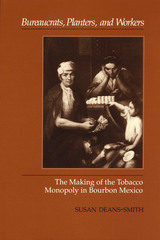
Honorable Mention, Bolton Memorial Prize, Conference on Latin American History
A government monopoly provides an excellent case study of state-society relationships. This is especially true of the tobacco monopoly in colonial Mexico, whose revenues in the later half of the eighteenth century were second only to the silver tithe as the most valuable source of government income. This comprehensive study of the tobacco monopoly illuminates many of the most important themes of eighteenth-century Mexican social and economic history, from issues of economic growth and the supply of agricultural credit to rural relations, labor markets, urban protest and urban workers, class formation, work discipline, and late colonial political culture.
Drawing on exhaustive research of previously unused archival sources, Susan Deans-Smith examines a wide range of new questions. Who were the bureaucrats who managed this colonial state enterprise and what policies did they adopt to develop it? How profitable were the tobacco manufactories, and how rational was their organization? What impact did the reorganization of the tobacco trade have upon those people it affected most—the tobacco planters and tobacco workers?
This research uncovers much that was not previously known about the Bourbon government's management of the tobacco monopoly and the problems and limitations it faced. Deans-Smith finds that there was as much continuity as change after the monopoly's establishment, and that the popular response was characterized by accommodation, as well as defiance and resistance. She argues that the problems experienced by the monopoly at the beginning of the nineteenth century did not originate from any simmering, entrenched opposition. Rather, an emphasis upon political stability and short-term profits prevented any innovative reforms that might have improved the monopoly's long-term performance and productivity.
With detailed quantitative data and rare material on the urban working poor of colonial Mexico, Bureaucrats, Planters, and Workers will be important reading for all students of social, economic, and labor history, especially of Mexico and Latin America.
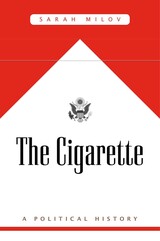
Los Angeles Times Book Prize Finalist
Winner of the Willie Lee Rose Prize
Winner of the PROSE Award in United States History
Hagley Prize in Business History Finalist
A Smithsonian Best History Book of the Year
“Vaping gets all the attention now, but Milov’s thorough study reminds us that smoking has always intersected with the government, for better or worse.”
—New York Times Book Review
From Jamestown to the Marlboro Man, tobacco has powered America’s economy and shaped some of its most enduring myths. The story of tobacco’s rise and fall may seem simple enough—a tale of science triumphing over corporate greed—but the truth is more complicated.
After the Great Depression, government officials and tobacco farmers worked hand in hand to ensure that regulation was used to promote tobacco rather than protect consumers. As evidence of the connection between cigarettes and cancer grew, scientists struggled to secure federal regulation in the name of public health. What turned the tide, Sarah Milov reveals, was a new kind of politics: a movement for nonsmokers’ rights. Activists took to the courts, the streets, city councils, and boardrooms to argue for smoke-free workplaces and allied with scientists to lobby elected officials. The Cigarette puts politics back at the heart of tobacco’s rise and fall, dramatizing the battles over corporate influence, individual choice, government regulation, and science.
“A nuanced and ultimately devastating indictment of government complicity with the worst excesses of American capitalism.”
—New Republic
“An impressive work of scholarship evincing years of spadework…A well-told story.”
—Wall Street Journal
“If you want to know what the smoke-filled rooms of midcentury America were really like, this is the book to read.”
—Los Angeles Review of Books
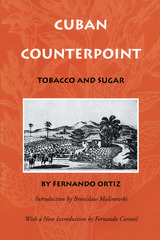
Ortiz presents his understanding of Cuban history in two complementary sections written in contrasting styles: a playful allegorical tale narrated as a counterpoint between tobacco and sugar and a historical analysis of their development as the central agricultural products of the Cuban economy. Treating tobacco and sugar both as agricultural commodities and as social characters in a historical process, he examines changes in their roles as the result of transculturation. His work shows how transculturation, a critical category Ortiz developed to grasp the complex transformation of cultures brought together in the crucible of colonial and imperial histories, can be used to illuminate not only the history of Cuba, but, more generally, that of America as well.
This new edition includes an introductory essay by Fernando Coronil that provides a contrapuntal reading of the relationship between Ortiz’s book and its original introduction by the renowned anthropologist Bronislaw Malinowski. Arguing for a distinction between theory production and canon formation, Coronil demonstrates the value of Ortiz’s book for anthropology as well as Cuban, Caribbean, and Latin American studies, and shows Ortiz to be newly relevant to contemporary debates about modernity, postmodernism, and postcoloniality.
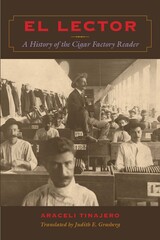
The practice of reading aloud has a long history, and the tradition still survives in Cuba as a hard-won right deeply embedded in cigar factory workers' culture. In El Lector, Araceli Tinajero deftly traces the evolution of the reader from nineteenth-century Cuba to the present and its eventual dissemination to Tampa, Key West, Puerto Rico, and Mexico. In interviews with present-day and retired readers, she records testimonies that otherwise would have been lost forever, creating a valuable archive for future historians.
Through a close examination of journals, newspapers, and personal interviews, Tinajero relates how the reading was organized, how the readers and readings were selected, and how the process affected the relationship between workers and factory owners. Because of the reader, cigar factory workers were far more cultured and in touch with the political currents of the day than other workers. But it was not only the reading material, which provided political and literary information that yielded self-education, that influenced the workers; the act of being read to increased the discipline and timing of the artisan's job.
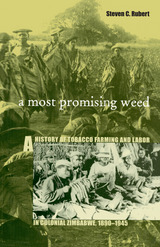
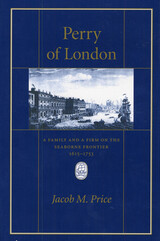
The Establishment of English colonies in North America and the West Indies in the seventeenth century opened new opportunities for trade. Conspicuous among the families who used these opportunities to gain mercantile and social importance was the Perry family of Devon, who created Perry and Lane, by the end of the century the most important London firm trading to the Chesapeake and other parts of North America.
Jacob Price traces the family from Devon to Spain, Ireland, Scotland, the Chesapeake, New England, and London. He describes their relationships with Chesapeake society, from the Byrds and Carters to humble planters. In London, the firm’s patronage gave the family high standing among fellow businessmen, a position the founder’s grandson utilized to become a member of Parliament and Lord Mayor of London. In the end, the grandson’s political success as an antiministerialist brought the family the enmity of the prime minister, Sir Robert Walpole, and contributed to the downfall of their firm.
The Perrys’ story reveals the interrelatedness of social, commercial, and political history. It offers an important contribution to our understanding of the nature of the Chesapeake trade and the forces shaping the success and failure of English mercantile enterprise in the seventeenth and eighteenth centuries.
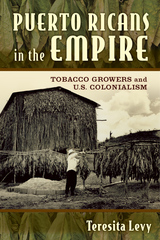
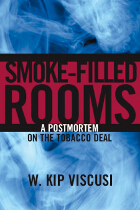
With Smoke-Filled Rooms,W. Kip Viscusi provides unexpected answers to these questions, drawing on an impressive range of data on several topics central to the smoking policy debate. Based on surveys of smokers in the United States and Spain, for instance, he demonstrates that smokers actually overestimate the dangers of smoking, indicating that they are well aware of the risks involved in their choice to smoke. And while smoking does increase medical costs to the states, Viscusi finds that these costs are more than financially balanced by the premature mortality of smokers, which reduces their demands on state pension and health programs, so that, on average, smoking either pays for itself or generates revenues for the states.
Viscusi's eye-opening assessment of the tobacco lawsuits also includes policy recommendations that could frame these debates in a more productive way, such as his suggestion that the FDA should develop a rating system for cigarettes and other tobacco products based on their relative safety, thus providing an incentive for tobacco manufacturers to compete among themselves to produce safer cigarettes. Viscusi's hard look at the facts of smoking and its costs runs against conventional thinking. But it is also necessary for an informed and realistic debate about the legal, financial, and social consequences of the tobacco lawsuits.
People making $50,000 or more pay .08 percent of their income in cigarette taxes, but people with incomes of less than $10,000 pay 1.62 percenttwenty times as much. The maintenance crew at the Capitol will bear more of the "sin tax" levied on cigarettes than will members of Congress who voted to boost it.
Cigarettes are not a financial drain to the U.S. In fact, they are self-financing, as a consequence of smokers' premature mortality.
The general public estimates that 47 out of 100 smokers will die from lung cancer because they smoke. Smokers believe that 40 out of 100 will die of the disease. Scientists estimate the actual number of 100 smokers who will die from lung cancer to be between 7 and 13.
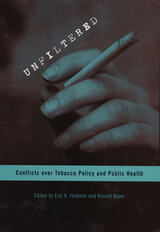
Tobacco, among the most popular consumer products of the twentieth century, is under attack. Once a behavior that knew no social bounds, cigarette smoking has been transformed into an activity that reflects sharp differences in social status.
Unfiltered tells the story of how anti-smoking advocates, public health professionals, bureaucrats, and tobacco corporations have clashed over smoking regulation. The nations discussed in this book--Australia, Canada, Denmark, France, Germany, Japan, the United Kingdom, and the United States--restrict tobacco advertising, tax tobacco products, and limit where smoking is permitted. Each is also struggling to shape a tobacco policy that ensures corporate accountability, protects individual liberty, and asserts the state's public health power.
Unfiltered offers a comparative perspective on legal, political, and social conflicts over tobacco control. The book makes a unique contribution to our understanding of how scientific evidence, global health advocacy, individual risk assessments, and governmental interests intersect in the crafting of tobacco policy. It features national case studies and cross-cultural essays by experts in health policy, law, political science, history, and sociology. The lessons in Unfiltered are crucial to all who seek to understand and influence tobacco policy and reduce tobacco-related mortality worldwide.
READERS
Browse our collection.
PUBLISHERS
See BiblioVault's publisher services.
STUDENT SERVICES
Files for college accessibility offices.
UChicago Accessibility Resources
home | accessibility | search | about | contact us
BiblioVault ® 2001 - 2024
The University of Chicago Press









